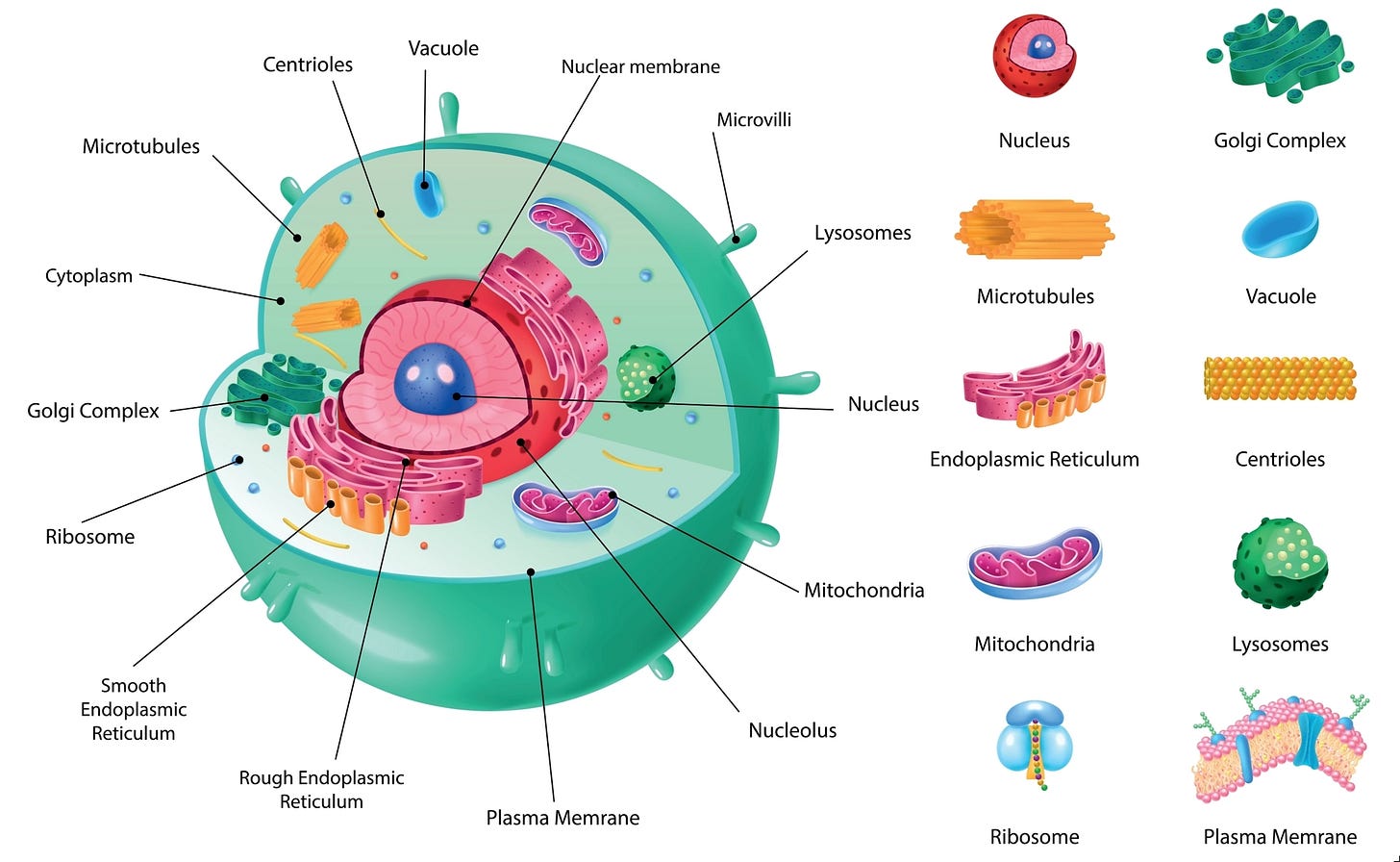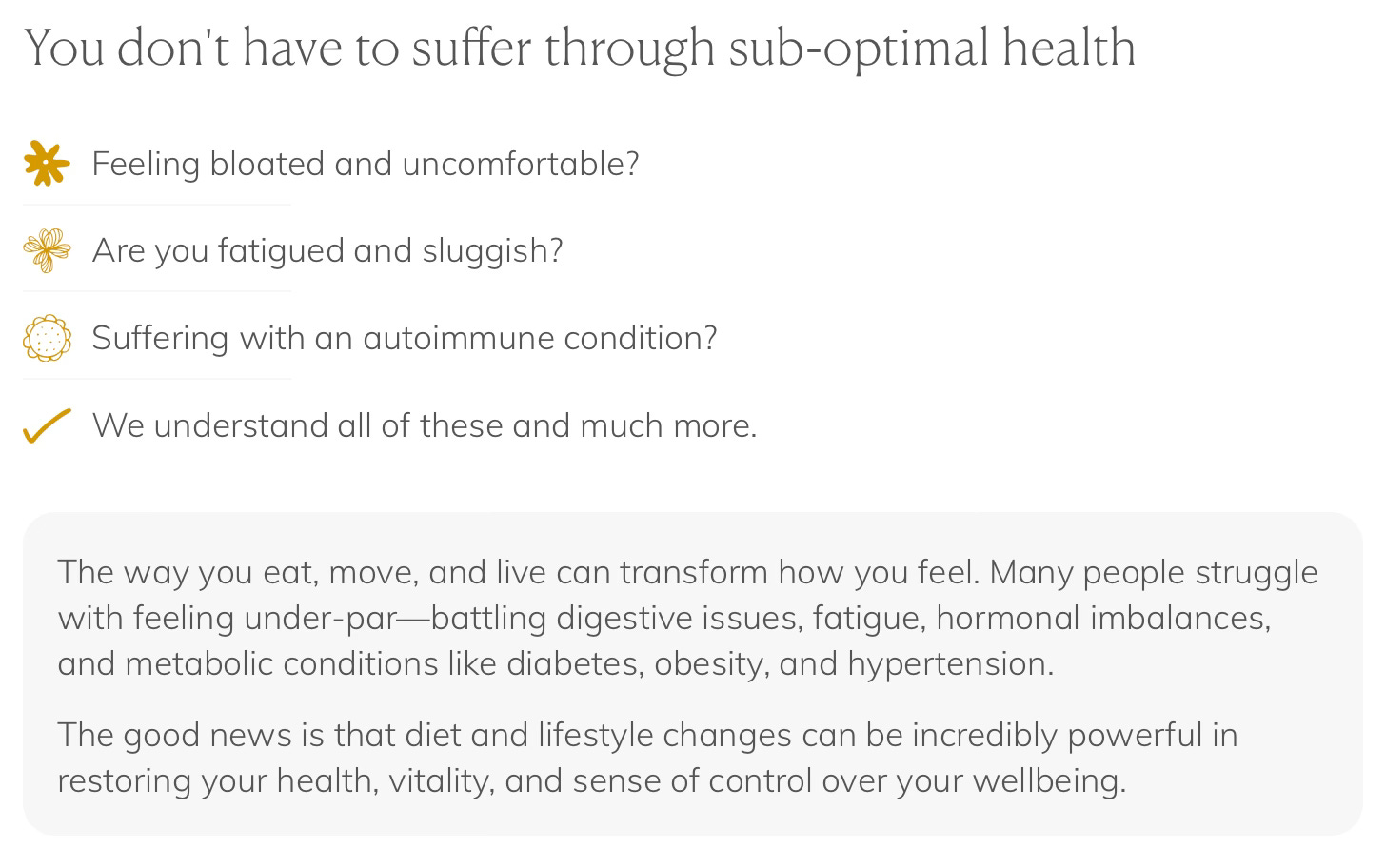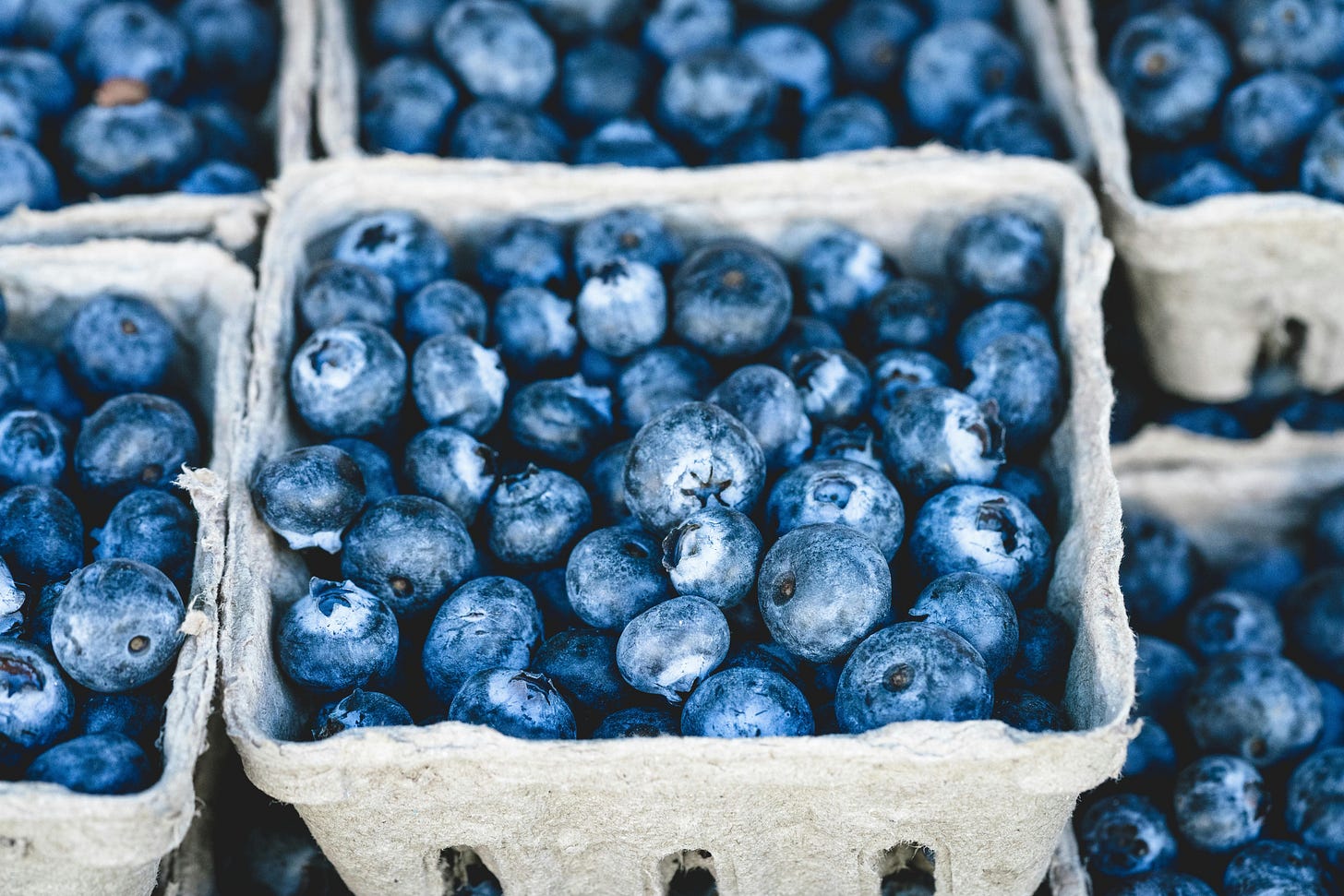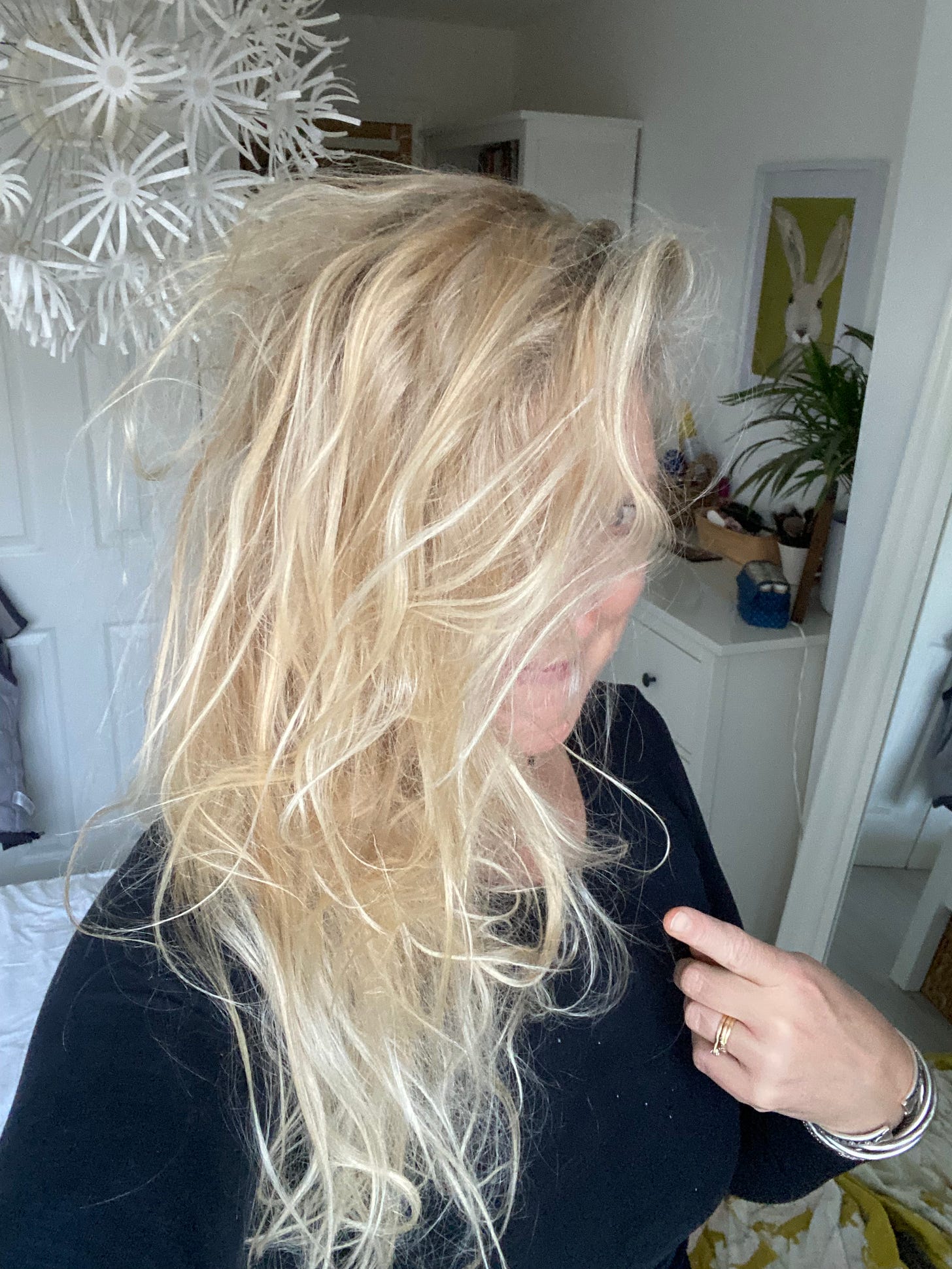Keep your hair on, and other things
Bobble hats in May; Ignoring your cells is asking for it; Neceberries; WeightWatchers down the toilet; Feed your hair or lose it; 'Ave a day off; The Dolly Parton of nutrients; From the dog basket.
May, for goodness sake; I saw a lady in a bobble hat today and I’m back in tights after a week of baring my mottled milk bottles to the sun. Goodness knows what the baby birds must think. Their mums were rubbing sun cream into little legs hanging out of nests last week, and now they’re frantically knitting socks.
Still, what’s a bit of chilly weather in the grand scheme of this mad planet? If you can’t control the world, you can switch off the news, eat something beautiful and listen to the birds (although you won’t hear them coming with socks on). Thank you, nature, for all of that. I still believe nature floats above it all, wending its quiet way through the seasons – un-fussed by orange blobs, very small despots, or brash turquoise toilet brushes who have not a flicker of feeling for it.
Let Nuush be your sanctuary. We love bringing flow into people’s lives. At Nuush, flow is the gentle calm that comes when you nourish your body with real food, live in touch with the seasons, and let go of extremes. It’s the quiet return of energy and ease – when everything begins to work as it should, without pushing hard or punishment.
You won’t find charcoal cleanses or carb bans here. That kind of rigidity stops the current. Instead, we make space for a lovely flowing life by gradually clearing the things that hold you back. The wine that wears you down, the food that clouds your mind, the stress, the broken sleep, the crazily-busy days. Life becomes smoother, easier and more natural when you support your body to do what it’s really always known how.
Think of yourself as a quiet stream, winding gently through the landscape, ebbing and flowing with the seasons – not crashing into dams or forced over cliffs. Just flowing, beautifully.
Thomas Thomarto just told me this all sounded a bit woo. But I think we need all a bit of woo at the mo, right?
Anyway, happy May. Bobble hats off at the ready.
Please take notice of your cells, they love you.
Long read but important for you to know.
When we think about our health, it's easy to focus on how big our stomach is or how many wobbly bits we have that we don’t want. All we want to do, often, is lose weight. End of.
Big mistake. HUGE.
The real thing to worry about is the health of our cells – all 37.2 trillion of them. They are what keeps us alive and they need plenty of support. But do you really know what they are, how they work or ever even give them a second thought?
While we might picture cells as just simple, spherical bubbles with some blobs inside, the truth is loads more complex. Cells come in all sorts of shapes, each suited to its unique job.
Imagine you’re walking through a huge, bustling city (you are that city). Everything in it is made up of tiny little houses. But these aren’t ordinary houses. Each one is alive. Each one is a cell.
Now zoom in on just one. This cell is like a small house with a soft but protective wall around it – the cell membrane. That wall knows what to let in and what to keep out. Inside, it’s really busy. There are multiple power stations (mitochondria) constantly generating energy to keep things going. There’s a control centre (the nucleus) where the plans for the entire house are stored – this is the DNA, full of instructions you got from your mum and dad, that say what this cell is meant to do, whether that’s building bone, helping with memory, fighting infection, being a red blood cell, or repairing damage.
There are other helpful parts too: little post offices and delivery vans (the Golgi apparatus), waste collection teams (lysosomes), builders, repair teams, and communication systems. Everything is moving, responding, and adapting all the time. One cell doesn’t do everything, even though it contains the instructions to do everything – each has a special job, and together, they make up every single wonderful bit of you. Your heart cells pump, your gut cells digest, your brain cells think. Some are round and soft, some are long and branching (nerve cells), some are ‘flooberdy’ (not in the Oxford dictionary BTW) like amoeba-shapes so they can squash and squeeze through little gaps and get at infection in order to zap it, some can even swim (sperm cells!). They’re not just flobberdy blobs – they’re beautifully adapted to what they do.
Even though each cell is its own little unit, they’re all connected in a way. Some cells are physically joined, like those in your muscles or skin, so they can work together to stretch or contract. Others aren’t directly linked but constantly talk to each other, sending signals to keep everything in balance. So yes, it’s like a city, where every house is wired to talk to the next one, making sure everything flows smoothly and the neighbours are kept informed.
When you move, think, heal, grow, breathe, or dream – it’s your cells that make it happen. You don’t notice them, but they’re the reason you exist at all.
And they need good food, water, rest and air…
Healthy fats from foods like oily fish, olive oil, avocados, seeds and nuts help keep the membrane all lovely and strong and flexible, but poor-quality fats from ultra processed foods can mean the cell membrane doesn’t work well – and then we start getting unwell. Vitamins and minerals play key roles in ensuring the organelles work efficiently. Magnesium stabilises the cell’s structure, while vitamins C and E act as antioxidants to protect DNA and other components from damage. DNA health is crucial to the cell’s health, and keeping it in good order requires nutrients like antioxidants, which protect it from damage. Without the right nutrition, the cell’s organelles can’t function at their best, and the whole system can break down. A cell needs flow but things like alcohol, smoking, being overweight or obese, being stressed and all the other things I regularly bang on about get right in the way of that beautiful flow.
Give your cells the gift of Nuush, they will love it!
But what I really want to stress here is the critical role that healthy dietary fats play, especially because they directly impact the structure and function of the cell membrane. The membrane is made up of a double layer of ‘phospholipids’, which are fats – imagine when you blow a soap bubble and its membrane is all lovely and fluid – these fats are responsible for giving the membrane both fluidity and strength. A healthy membrane is vital for proper communication between cells, as it helps electrical signals to pass smoothly. And believe me, there is a lot of electrical signalling going on in your body – every process, from muscle contraction to brain function, relies on it. And remember, it’s the wall of the building and needs to let things in and out, and it can’t do that if its doors are all stiff and stuck.
Polyunsaturated fats, in particular, are vital for this process. They help keep the beautiful flexibility of the cell membrane, allowing it to respond to external signals and manage nutrient and waste exchange efficiently. Omega-3 fatty acids, found in oily fish like salmon, sardines, anchovies and mackerel, as well as in nuts and seeds, are a key player in supporting this. These fats also contribute massively to reducing inflammation and supporting heart and brain health. Monounsaturated fats, found in avocados, olive oil and certain nuts, are equally important, giving stability to the membrane while also supporting overall cell health. Consuming a variety of unrefined plant oils (especially extra virgin olive oil), avocados, oily and other fish, nuts and seeds helps ensure that your cells have the essential fats they need to function like magic.
Yes, you own 37.2 trillion pieces of absolute magic - how lucky are you?! Now look after them please 🥰
Nutritional therapy is a wonderful thing
Since our last Substack, I’ve been working with more people through one-to-one nutritional therapy – and it’s been so brilliant to see the impact. It’s such a privilege to help someone feel like themselves again, to watch them re-engage with life, and to support real improvements in long-term health. In some cases, I’ve had messages from GPs thanking me for helping to reverse type 2 diabetes through nutrition and lifestyle change.
If you’re dealing with a health issue and unsure how food fits into your management and recovery, or if you’re just not feeling like your best self – tired, foggy, inflamed – let’s talk. Nutritional therapy is all about understanding what’s happening inside your body, then building a personalised approach to support you in feeling stronger, clearer and more alive.
Book today - we now have staggered payment options too.
Berries are very necessary (veryneceberry)
If you’re not going to eat much fruit (join my personal club – I prefer broccoli and peas), at least make space for a handful of berries most days. Why? Because they are utter bombs of nutrition. Technically speaking, they’re little seed hubs – and the seed of a plant is where all the clever stuff lives. Plus, their deep red and purple colours are a giveaway that they’re rich in plant nutrients known as polyphenols – especially anthocyanins, resveratrol, and, wait for it… epigallocatechin gallate. Don’t glaze over please – these compounds are incredibly good at protecting your cells from damage by ‘free radicals’, those tiny troublemakers that can chip away at our health over time.
Not only that, but berries also give your immune system a lift, support brain health, and help keep inflammation in check. And they do all that in a few juicy bites. So even if you're not big on fruit, pop a few berries on your porridge, swirl them into yoghurt, or just eat them straight from the punnet. Tiny but mighty, they’re one of the easiest ways to nourish yourself right down to the cellular level.
Oh crikey, WeightWatchers might go bust!
Yes, Mounjaro and its needle-dwelling friends have almost claimed their first major diet industry victim. As millions turn to weight-loss injections, traditional weight-loss companies are starting to crumble.
WeightWatchers, once a household name linked with community-based dieting, is reportedly preparing to file for bankruptcy. The rise of GLP-1 medications like Ozempic and Mounjaro has brought about a new craze in weight management, offering quick results that traditional programmes struggle to match.
Thank goodness Nuush has always been about true health, not just shedding pounds. Yes, we very much help people lose weight when needed, but it’s never the whole picture. Our focus is on optimising health in every sense – expanding the range of nourishing whole foods people eat so their bodies can look, feel, and be robust, energised, and well. That means good muscle tone, glowing skin, healthy hair, and happy, well-functioning cells and vital organs.
At Nuush, we believe in sustainable, wholesome eating and living over quick fixes. While the pull of fast weight loss is understandable, true health means more than just the number on the scales. It's about nourishing your body, mind, and spirit — encouraging healthy longevity and energy without missing out on the joys of eating and living well.
If you are using GLP-1 weight loss drugs please book a free 15 min call to see how Nuush can support your nutrition alongside.
Eating for healthy hair (and keeping it on your head)
Hair might seem as if it just grows and ‘is what it is’, but your hair is a really good barometer of what’s going on inside. Thinning, brittle, very greasy or dull hair can reflect stress, hormonal changes, nutrient deficiencies or inflammation – all stuff that is affected by how we eat and live.
At Nuush, we support hair from the inside out – starting with proper nourishment.
Protein is key. Hair is made from keratin, a type of protein, and it needs a regular supply of amino acids to grow and stay strong. That means including good-quality protein in most meals – like eggs, fish, pulses, fermented dairy (yoghurt, cheese, kefir), nuts, seeds and a little bit of meat if that suits you.
Iron and B vitamins are also vital. Low iron is a common cause of hair thinning, particularly in women. Include iron-rich foods like leafy greens, lentils, eggs and some red meat if appropriate – and eat plant sources of iron with vitamin C to help absorption. B vitamins, especially biotin, B12 and folate, are essential for cell growth and healthy hair structure. You’ll find biotin in foods like eggs (especially the yolks), nuts, seeds, sweet potatoes, salmon and wholegrains. Vitamin B12 is found mainly in animal products such as meat, fish, eggs and dairy. Vegetarians who restrict, and definitely vegans need to include fortified foods like plant milks, nutritional yeast or cereals. For folate, it’s leafy greens like spinach and kale, as well as broccoli, asparagus, peas, beans, avocado, lentils and citrus fruits
And go large on the healthy fats. Omega-3 fatty acids, found in oily fish, walnuts, flaxseeds and chia, help keep your scalp healthy and your hair soft and flexible. Fat is also needed to absorb fat-soluble vitamins like A and E, which support skin and scalp health.
Brightly coloured fruit and vegetables give you a whack of antioxidants like vitamin C and beta-carotene, which help protect hair follicles from oxidative stress. Berries, sweet potatoes, spinach, peppers and carrots are all excellent choices.
Minerals matter bigly, too. Zinc and selenium are involved in tissue repair, hormone regulation and scalp health, and can be found in nuts, seeds, whole grains, shellfish and eggs.
Finally, hydration and good circulation support hair growth. Hair follicles need water and a healthy blood supply, so drink enough fluid and keep your body moving regularly. Rest and stress also affect hair – your nervous system needs calm if your body is going to prioritise hair growth. When you’re stressed, your body releases hormones like cortisol that can quietly mess with your hair cycle. Instead of staying in the growing phase, more hairs can stay in the resting phase, which means they’re more likely to fall out a few months later. Stress can also reduce the nutrients reaching your hair follicles and increase inflammation, making it harder for your hair to stay strong and healthy. In some cases, stress can even trigger your immune system to attack the follicles directly. The good news? Supporting your body with calm, good food and rest can massively help to get things back on track.
Hair health doesn’t come in a supplement bottle. But with the right nourishment, flow and care, your body will get it sorted!
Hair-food check. How many of these are you eating very regularly?
Eggs, fish, pulses, yoghurt, cheese, kefir, nuts, seeds, meat, leafy greens like spinach and kale, lentils, beans, chickpeas, tofu, red meat, sweet potatoes, salmon, whole grains, fortified plant milks, nutritional yeast, fortified cereals, broccoli, asparagus, peas, beans, avocado, extra virgin olive oil, citrus fruits, oily fish, walnuts and other nuts, flaxseeds, sunflower seeds, pumpkin seeds, quinoa, chia seeds, berries, peppers, carrots and shellfish.
Nourish you and your hair with Nuush
Overdoing it sucks
I see a lot of people’s daily schedules, and over the years some of them have made my toes curl. It’s not unusual for someone to be exercising every single day – sometimes twice, or even three times. They’re up early to train, then off to work, then dashing to another commitment, squeezing in more exercise on the way back, heading out again in the evening, and packing even more into the weekend by flying off somewhere to do more. Add screen-use into this and you can see where it’s all heading.
Others are juggling busy family lives, where each child – and often each parent – has a daily extra-curricular activity. That means driving back and forth for miles, eating on the hoof, late nights, early mornings, and not a single weekend day free of scheduled activity.
Aaarghhh (this is the voice of your endocrine system shouting!)
It’s easy to think that we’re being awesome and productive, striving to fit more in, push ourselves harder, and do more for our health and for our children. But what happens when we push too far all the time? The body can’t keep up with the constant demands of over-exercising, endless activity, and chronic stress – that includes kids too, who need space and downtime and A LOT of sleep. What we end up with is disrupted hormone balance, exhaustion, immunity prang-up, high cortisol, inflammation, stress, anxiety, depression and a ton of belly fat in lots of cases.
In the case of exercise “‘ave a day off” is brilliant advice, and is what elite athletes do. In fact they build quite large blocks of rest into their year. They know that it’s only when you have rest days that your body has time to adapt to the load you’re placing on it; otherwise it’s in a permanent state of breakdown. Sometimes, people who recreationally exercise to the max (non elites) are some of the fittest but least healthy people around, and with terrible immune function! I want to say here, that I have been this person, and I messed a few things up in the process. I nag from a place of experience.
So if you are on one of our personalised plans and you get a ‘Mrs Weasley Howler’ from me about the importance of rest days (from life and from exercise) it’s because I know what lack of downtime can do; and I care enough to try and stop you from breaking yourself.
“We flounder through life, struggling desperately so we won't drown, even though we would float if we’d just relax.”
Natsui Takaya
🎼 Choline, Choline, Choliiine, Cho-lii-iiii-iiiine
Choline is a sort of forgotten and hardly-mentioned nutrient that plays a vital role in your body, especially when it comes to your brain and liver health – both fairly critical items…. It’s crucial for making the hugely important neurotransmitter acetylcholine, which ramps up your memory, mood and muscle control.
By the way, it’s what Dolly Parton meant to sing about, but she changed it to Jolene at the last minute…
Choline also helps your liver by giving it a hand with dealing with fat, so you don’t get a big flubberdy liver! But its importance goes way beyond just general health – choline is really crucial during pre-conception and pregnancy. It supports development of the baby’s brain and spinal cord and can even help reduce the risk of neural tube defects. Getting enough choline also helps keep your cells healthy – and you know all about that by now if you’ve been reading everything properly. And it helps with hormone balance, and overall fertility.
With so many essential roles, making sure you're getting enough choline is a bloody good idea.
What’s it in?
Choline is found in eggs (especially the yolks), liver (beef or chicken), salmon, shellfish (big time), chicken, turkey, dairy products like milk, cheese, kefir and yogurt, soya beans (think tofu and edamame), quinoa, broccoli, Brussels sprouts, nuts, seeds and whole grains. These foods are some of the best sources of choline, with animal products typically providing the highest amounts.
“I had to have this talk with you
My happiness depends on you
And whatever you decide to do
Cho-leeeeeen.’
Dolly’s original lyrics. Honestly.
From the dog basket
Sedge has lost quite a few of his dinky baby teeth, and now has shiny new and very white fangs popping up - to match his very extremely shiny adult coat that’s developing. Luckily, he has no idea how to use his teefs aggressively and is far more keen on snogs than ripping anything to pieces, apart from my slippers. Woe betide you if you visit though, because he will shower you relentlessly with love, hugs and ear kisses (obvs not if you are a burglar reading this - and anyway, you would have Evie to contend with…). He has all the collie traits – in love with tennis balls, snuffling in mud, drinking my tea, chasing hosepipes, drinking my bath water and burying bones all over the garden. And he is a very gud boi at sitting, STAYing, coming back when called, and giving paw – especially when I’m making toast, or making anything, really. He met his Arnty Cristeen from Scotlund for the first time, and her ‘Bradlador’ Skye, and he had his BFF, Obi the black Bradlador to stay as well. So it’s all been very exciting for a growing pup.
As for Evie, well, she has had several full-shampoo showers since we last spoke. There is literally nothing she hasn’t caked herself in. She’s also had a hair cut, but as she wouldn’t keep still she’s ended up looking as if she’s had a very bad experience at a hairdresser training college. Oh and she’s eaten a lot of dead things. Anyone want a miniature wire-haired Dachsund for a couple of weeks? There must be respite centres for their owners, all over the country.
Lottie has also emblackened herself every day, via the medium of pond-wallowing. Then when I give her a shower she immediately goes and rolls in the flower bed. This is why I have to change the bedclothes three times a week, I’m not even joking.
They all (and I) had an alarming moment the other day when they found a cigarette end up in the wilderness where we walk. It was thoroughly examined, and tasted, for a very long time. The investigation is ongoing.
So, all-in-all, not a lot changes and I essentially need to keep working in order to buy ‘Poochpampshoo’ and pay vet bills (let’s not even talk about the cost of those).
They all say they love you and, by the way, any snacks must be sent to ‘Papmpshoo Central, The Fens, East Angular, Englund, The wurld, The Yewniverss’. Thankyew.
Lots of love from us all xxx












Just love these newsletters. So full of information and fun things too. Love the update on the menagerie. xx
Love hearing about the good the bad and the ugly. 😆